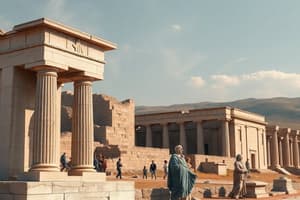Podcast
Questions and Answers
What does the term 'arche' refer to in ancient Greek philosophy?
What does the term 'arche' refer to in ancient Greek philosophy?
- The most powerful god
- A form of government
- A mythological story
- The underlying principle of everything (correct)
Which ancient philosopher is known for the concept of 'unity of opposites'?
Which ancient philosopher is known for the concept of 'unity of opposites'?
- Heraclitus (correct)
- Plato
- Pythagoras
- Anaximander
What did Aristotle mean by 'eudaimonia'?
What did Aristotle mean by 'eudaimonia'?
- The study of ethics
- Intellectual success
- A method of questioning
- A state of happiness or flourishing (correct)
Which of the following best describes Socrates' method of teaching?
Which of the following best describes Socrates' method of teaching?
What does 'temperance' refer to in Aristotle's philosophy?
What does 'temperance' refer to in Aristotle's philosophy?
Who is considered the father of cosmology?
Who is considered the father of cosmology?
What is the key idea represented by fire in Heraclitus's philosophy?
What is the key idea represented by fire in Heraclitus's philosophy?
Which philosopher was known for the Allegory of the Cave?
Which philosopher was known for the Allegory of the Cave?
Flashcards are hidden until you start studying
Study Notes
Philosophical Historical Periods (AMMC)
- Ancient philosophy focuses on the world or cosmos.
- Medieval philosophy emphasizes God or the absolute being.
- Modern philosophy centers on the self.
- Contemporary philosophy explores the concept of others.
Ancient Greece Overview
- Early beliefs attributed events to supernatural stories involving gods and goddesses.
- Gradual distrust in myths led to a desire for rational explanations.
- Greeks sought the arche, which signifies the origin or underlying principle of existence.
Presocratic Philosophers
- Thales: Advocated that all things are composed of water; first to predict a solar eclipse; connected to the "seven sages" of Greece.
- Anaximander: Introduced the concept of Apeiron (the boundless); first metaphysician and father of cosmology; published the first world map.
- Anaximenes: Proposed air (through rarefaction and condensation) as the basic substance of matter.
- Heraclitus: Known for the unity of opposites; emphasized that change is the only constant (symbolized by fire).
- Pythagoras: Renowned mathematician; known for the Pythagorean theorem; posited that numbers constitute the essence of all things.
Classical Greek Philosophy
- Socrates: Lacked written works; faced execution for allegedly corrupting youth and impiety; famous for the Socratic method and ethical inquiries.
- Plato: Student of Socrates; introduced the theory of forms and authored "The Republic" and the "Allegory of the Cave."
- Aristotle: A student of Plato and teacher of Alexander the Great; founded the Lyceum; known for virtue ethics and the concept of the Golden Mean in "Nicomachean Ethics."
Aristotle's Concept of Eudaimonia
- Eudaimonia represents ultimate happiness through virtuous living.
- Key virtues include:
- Courage: Balancing fear in rational ways.
- Temperance: Practicing self-control and moderation.
- Wisdom: Seeking practical wisdom or prudence (Phronesis).
- Justice: Pursuing impartial judgment, including distributive and corrective justice.
Medieval Philosophers
- St. Augustine: Promoted the idea of Divine Illumination, emphasizing the mind's need for enlightenment.
- St. Thomas Aquinas: Known for the concept of exitus et reditus, relating to the creation and return to God.
Modern Philosophers
- Notable figures include René Descartes, John Locke, and David Hume.
Contemporary Philosophers
- Key thinkers include Martin Buber, Edmund Husserl, and Martin Heidegger.
Studying That Suits You
Use AI to generate personalized quizzes and flashcards to suit your learning preferences.




